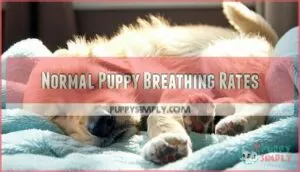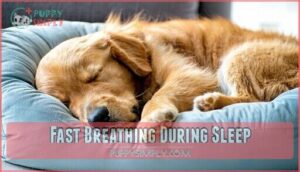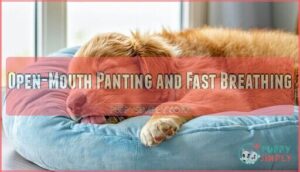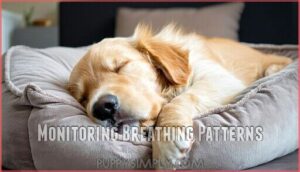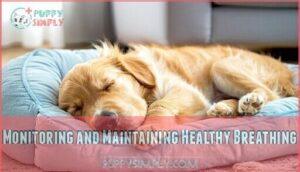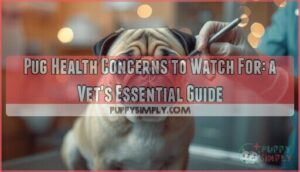This site is supported by our readers. We may earn a commission, at no cost to you, if you purchase through links.

Puppies have higher breathing rates than adult dogs, ranging from 15–40 breaths per minute, and these can temporarily speed up during deep sleep.
However, keep an eye out for warning signs like gasping, wheezing, or labored breathing when they’re awake, as these might need a vet’s attention.
Overheating, stress, or an underlying issue could also cause this, and knowing your pup’s normal patterns can help you spot when something’s off.
Curious about the details? Read on!
Table Of Contents
- Key Takeaways
- Normal Puppy Breathing Rates
- Fast Breathing During Sleep
- Breathing Rates During REM Sleep
- Environmental Factors Affecting Breathing
- Distinguishing Panting From Fast Breathing
- When to Seek Veterinary Attention
- Monitoring and Maintaining Healthy Breathing
- Frequently Asked Questions (FAQs)
- Is 120 breaths per minute for a puppy?
- Should I worry if my dog is breathing fast?
- Is there anything I can do to prevent my puppy from breathing rapidly during sleep?
- What are the potential causes of rapid breathing in puppies while sleeping?
- What noises are normal during puppy sleep?
- Do diet changes affect puppy breathing rhythm?
- Can specific breeds breathe differently during sleep?
- Are humidifiers helpful for improving puppy breathing?
- How does room lighting impact sleep breathing?
- Conclusion
Key Takeaways
- Don’t get alarmed if your puppy breathes fast while sleeping—it’s often normal during REM sleep when they dream and burn more energy.
- Watch for warning signs like gasping, wheezing, or labored breathing during wakefulness—these could signal something serious.
- Know your pup’s typical breathing rate (15–40 breaths per minute) to spot potential issues and act early.
- Create a cool, stress-free sleep environment to help them rest better and monitor unusual patterns.
Normal Puppy Breathing Rates
Puppies naturally breathe faster than adult dogs because their lungs are smaller and their bodies burn more energy.
Smaller lungs and higher energy needs make puppies natural rapid breathers, especially during sleep or play—completely normal puppy physiology!
A normal resting breathing rate for puppies is usually between 15 and 40 breaths per minute, depending on age and activity.
Breathing Patterns During Sleep
Your sleeping puppy’s breathing patterns can seem unusual, but it’s often normal.
During deep sleep, you might notice irregular breathing or rapid REM breathing — common in dreaming pups.
Sleep positions can also affect how your puppy’s chest moves.
Puppy breathing quickly during dreams or twitching is typical.
However, monitor for consistent irregular breathing, like sleep apnea.
Breathing Rates During Physical Activity
After playing or running, your puppy’s breathing naturally speeds up.
Exercise intensity, breed differences, and hydration influence how much their breathing rate spikes.
Puppies rely on fast breathing as a cooling mechanism since they can’t sweat like us.
Once play pauses, post-activity recovery should bring their breathing back to a normal rhythm fairly quickly—usually a couple of minutes.
Factors Affecting Breathing Rates
Your puppy’s breathing rate depends on factors like age influence, breed predisposition, body size, and metabolic demands.
Smaller breeds and younger puppies naturally breathe faster. Hydration levels also matter—dehydrated pups may pant or breathe quickly.
Watching a sleeping puppy breathing rapidly can seem alarming, but it’s often normal. Know what’s typical to spot puppy health concerns and prevent puppy breathing problems.
Heavy breathing may also be caused by underlying medical conditions, which can be a sign of underlying medical conditions that need attention, and understanding these factors is key to ensuring your puppy’s breathing rate and overall health are normal, and to address any puppy health concerns.
Fast Breathing During Sleep
When your puppy breathes fast while sleeping, it’s usually nothing to worry about and can be part of normal sleep patterns.
Understanding what’s typical during rest helps you spot when something might need closer attention.
Normal Causes of Fast Breathing
Your sleeping puppy breathing fast might seem odd, but it’s often perfectly normal.
Puppies have smaller lungs and a higher metabolic rate, meaning their oxygen needs are greater.
During REM sleep, their dreams ramp up activity, leading to quickened puppy breathing patterns.
- Reasons for normal fast breathing:
- Small lung size
- High oxygen needs
- Natural puppy physiology
- Age variations
- Active REM sleep
Abnormal Causes of Fast Breathing
If your puppy’s rapid breathing during sleep seems unusual, it might signal issues like respiratory infections, heart problems, or anemia.
A diaphragmatic hernia can also cause trouble by compressing the lungs.
Some breeds, like Bulldogs, are predisposed to breathing challenges.
If fast breathing persists or your puppy seems distressed, consult a vet immediately to rule out serious conditions and address potential issues like a diaphragmatic hernia that can cause trouble by compressing the lungs, which may be related to breathing challenges.
Breathing Rates During REM Sleep
During REM sleep, your puppy’s breathing might speed up as they use more energy and experience dreams.
This rapid breathing is usually temporary and a normal part of their sleep cycle.
Increased Energy Use and Dreaming
During REM sleep, your puppy’s brain activity increases, sparking lively dreams and higher oxygen needs.
This stage, part of their sleep cycle, involves temporary muscle atonia to prevent movement, yet it also triggers puppy REM sleep breathing.
Their fast breathing puppy sleep pattern is due to dreaming oxygen needs, with rapid breaths supporting brain development and growth.
It’s completely normal!
Temporary Rapid Breathing
During REM sleep, short-term causes like emotional triggers or cooling mechanisms can lead to puppy rapid breathing.
It’s common for a fast-breathing puppy during sleep to cycle through these phases as they process dreams or recover from post-exercise breathing.
Don’t worry—fast breathing puppy sleep often resolves quickly, especially if linked to excitement-induced panting or temporary energy needs.
A resting rate above this could indicate potential health issues, which may be related to temporary energy needs or other factors, and it is essential to monitor puppy rapid breathing to ensure the puppy’s health and well-being.
Environmental Factors Affecting Breathing
Your puppy’s breathing can speed up during sleep if the environment is too warm or stressful.
Factors like overheating, noise, or unfamiliar situations may affect their comfort and breathing patterns.
Overheating and Rapid Breathing
When your pup overheats, their rapid breathing is their way of cooling down.
Stay vigilant and help them chill:
- Provide shade for temperature control.
- Make sure plenty of water to maintain hydration.
- Remove blankets or excessive bedding.
- Use fans or cooling mats as effective cooling techniques.
- Watch for heatstroke signs like excessive panting or lethargy.
Keep them comfy and ensure they have access to plenty of water to stay hydrated.
Anxiety and Stress-Induced Breathing
If your little friend’s puppy breathing seems unusually quick during sleep, anxiety could be the culprit.
Sudden noises, new routines, or changes in their space might leave them uneasy.
Focus on calming techniques like soft voices, gentle petting, and a consistent bedtime routine.
Environmental stability brings comfort, while reassurance methods ease puppy breathing anxiety—helping avoid behavioral changes or sleep troubles like puppy sleep apnea.
Distinguishing Panting From Fast Breathing
It’s easy to confuse panting with fast breathing, but knowing the difference can help you spot potential problems.
Panting usually involves an open mouth, while fast breathing happens with a closed one, especially during sleep, and this distinction is key to understanding potential problems.
Open-Mouth Panting and Fast Breathing
Panting vs. breathing can be tricky to tell apart.
Panting involves open mouths, while fast breathing happens with closed ones.
Sleep panting causes can include heat, excitement, or mild discomfort.
A puppy breathing heavily during rest might need a more comfortable sleep environment.
Monitoring panting patterns helps spot emergency panting signs, ensuring your puppy’s snoozes stay peaceful and healthy!
Panting at night could also be related to underlying heart conditions.
Monitoring Breathing Patterns
Keeping an eye on your puppy’s breathing patterns helps you spot issues early.
Establish a baseline by counting breaths during deep sleep—15 to 40 per minute is typical.
Rate variability depends on health, activity, or stress.
Record keeping is handy for veterinary consultations.
Recognizing symptoms like labored breathing guarantees your pup’s well-being.
A breathing monitor purchase can offer added peace of mind.
Healthy puppy sleep monitoring prevents worry.
When to Seek Veterinary Attention
If your puppy’s fast breathing doesn’t slow down or comes with other signs like coughing, pale gums, or lethargy, it’s time to call your vet.
Breathing problems can indicate serious issues, so acting quickly can help keep your pup safe.
Accompanied by Other Symptoms
Sometimes, fast breathing comes with other warning signs.
Keep an eye out for these symptoms in your puppy:
- Lethargy and breathing issues together signal distress.
- Gum color changes, like pale or blue gums, could mean trouble.
- Breathing and fever, or appetite loss, point to serious health concerns.
Consider using a dog’s oxygen levels to monitor their breathing.
If your puppy’s breathing seems irregular or heavy, seek veterinary care immediately.
Persistent Fast Breathing
If your puppy’s breathing stays fast for extended periods, it might signal Chronic Tachypnea or an underlying condition.
Irregular patterns, heavy breathing, or a fast heart rate during rest shouldn’t be ignored. Watch for signs like gasping or respiratory distress in sleep.
A pulse oximeter reading can help monitor your pet’s oxygen levels.
Persistent issues require diagnostic testing to avoid long-term effects and explore proper management options. Consult a vet promptly.
Result of Heatstroke
If your puppy’s heavy breathing or rapid heart rate occurs alongside heatstroke symptoms—like bright red gums or lethargy—act quickly.
Cool them down using water, shade, and ventilation. Make certain hydration is available.
Fast breathing while sleeping may point to overheating, and a vet visit is essential.
Prevention strategies, like avoiding hot environments, can help stop heatstroke entirely.
Monitoring and Maintaining Healthy Breathing
You can help your puppy stay healthy by keeping an eye on their breathing and learning what’s normal for them.
By understanding their baseline and recognizing unusual patterns, you’ll know when to take action and keep them comfortable.
Establishing Baseline Breathing Rates
To set a puppy breathing baseline, observe their resting rate during deep sleep.
Count chest rises for 60 seconds, ensuring a calm environment.
Recognize individual variation, as rates differ by age, size, and activity.
Regular puppy breathing measurements help you track respiratory rate influences.
Consistent puppy breathing observation can provide insights for a veterinary consultation, ensuring your pup stays healthy.
Recognizing Emergency Symptoms
Abnormal puppy breathing during sleep, like labored breathing or puppy gasping sleep, needs attention.
Watch for open-mouth breathing, excessive drooling, or pale gum color. Reluctance to move or unusual behavior can signal puppy respiratory distress.
Breathing emergencies, like heavy breathing or odd sounds, aren’t normal. If your puppy’s breathing is irregular or accompanied by new symptoms, contact your vet immediately for puppy respiratory distress or if you notice excessive drooling.
Providing a Comfortable Environment
Creating a good puppy sleep environment is simple.
Keep the room cool, ensuring proper air quality and providing comfortable bedding. A "Cool Sleep Space" helps maintain their temperature while boosting puppy sleep quality.
Make sure they’ve proper hydration nearby, and reduce anxiety with soft textures or familiar scents.
Consider a donut pet bed to provide a secure space. These puppy sleep tips promise better rest for them—and peace for you!
Frequently Asked Questions (FAQs)
Is 120 breaths per minute for a puppy?
Imagine counting breaths like waves at the beach—120 per minute is unusually rapid.
This isn’t normal for resting puppies, so keep an eye out.
If persistent, chat with your vet for advice.
Should I worry if my dog is breathing fast?
If your dog is breathing fast, it’s worth observing closely.
Rapid breathing during rest or sleep can be normal, but watch for signs like distress, blue gums, or unusual behavior.
When in doubt, ask your vet!
Is there anything I can do to prevent my puppy from breathing rapidly during sleep?
Puppies can take up to 50 breaths per minute during sleep, mostly due to dreaming or growth.
To help, create a cozy, cool space, limit stimulating activities before bed, and monitor their breathing for changes.
What are the potential causes of rapid breathing in puppies while sleeping?
Rapid breathing in puppies during sleep often happens during REM cycles, where they dream and use more energy.
Other causes might include excitement, recent activity, or overheating, but it’s usually just normal puppy behavior.
What noises are normal during puppy sleep?
Like whispers in a quiet room, soft snores, gentle whimpers, and occasional yips are completely normal during puppy sleep.
These sounds often mean they’re dreaming, processing their day, and resting comfortably.
Do diet changes affect puppy breathing rhythm?
Changing your puppy’s diet can impact their breathing rhythm, especially if it causes allergies, bloating, or nausea.
Keep an eye on symptoms like panting, restlessness, or discomfort, and consult your vet if concerns arise, focusing on symptoms.
Can specific breeds breathe differently during sleep?
Certain breeds, like Bulldogs or Pugs, may breathe differently due to their short noses and restricted airways.
During sleep, their breathing might seem noisier or more labored.
Always monitor for abnormal signs and consult your vet.
Are humidifiers helpful for improving puppy breathing?
Using a humidifier helps by keeping the air moist, which can ease your puppy’s breathing, especially in dry environments.
It’s like adding a little comfort to their space, making it easier to snooze peacefully.
How does room lighting impact sleep breathing?
Dim lighting helps create a calm environment, allowing better regulation of breathing during sleep.
Bright or flickering lights can disrupt rest, leading to irregular breathing.
A softly lit or dark room promotes deeper, steady puppy sleep, and helps with better regulation of breathing.
Conclusion
While a puppy breathing fast while sleeping can seem alarming, it’s often just a harmless part of REM sleep, where dreams take over.
However, don’t ignore unusual signs like gasping or labored breathing when they’re awake—those might need a vet’s attention.
Keep an eye on your puppy’s normal breathing patterns and create a calm, cool environment to help them unwind.
Staying observant guarantees you’ll notice if something’s truly wrong, keeping your puppy both safe and happy.

